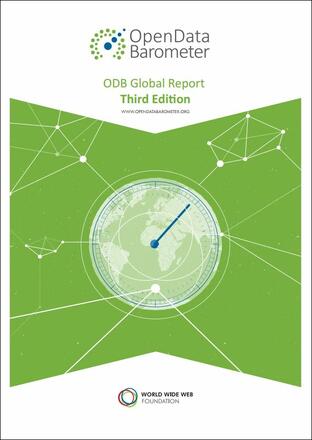
Open Data Barometer 3rd edition
Increasingly seen as something more than a tool to hold governments accountable, Open Data is a driver of innovation and crucial to sustain development, particularly as the Sustainable Development Goals (SDGs) presented last year, placed great emphasis on data’s importance to development, contributing to placing Open Data in the political agenda. As a consequence, the Global Partnership for Sustainable Development Data and the International Open Data Charter were launched.
Covering 92 countries in the present edition, the Open Data Barometer ranks nations on:
- Readiness: How prepared are governments for open data initiatives? What policies are in place?
- Implementation: Are governments putting their commitments into practice?
- Impact: Is open government data being used in ways that bring practical benefit?
Key findings of the report:
- Open data are going mainstream: 55% of the countries considered in the report now have an open data initiative. Notably, the demand exceeds the offer: civil society and the tech community are using government data in 93% of countries surveyed, even in countries where that data is not yet fully open.
- Implementation and impact of open data commitments is stalling: despite the increase in the number of countries adopting Open Data plans, critical data remain largely inaccessible (only two countries publish acceptable detailed open public spending data). Dataset are very often closed, or are given in a poor format which makes their use practically impossible.
- Open-Washing concerns: governments may exploit open data programs to fabricate a positive image of their commitment for transparency. Open data programs are not self sufficient, as they need to be supported by a culture of openness. In this edition, a backslide is noted on freedom of information, transparency, accountability, and privacy indicators in some countries.
- Open Data Initiatives require stronger legal frameworks and long-term strategies. Governments tend to consider open data as experiments with little to no long-term strategy behind its implementation. This results in haphazard implementation, weak demand and limited impact.
- Open data availability and capacity remains heavily concentrated in the rich world. A significant disparity is noted in the distribution of Open Data programmes across the world: twenty-six of the top 30 countries in the ranking are high-income countries, and this is at risk of creating “a whole new inequality frontier”.
What is open data & why is it important?
In a well-functioning democratic society, citizens need to be informed and have access to information on government policies and progress. Open data — data which is freely available and shareable online, without charge — dramatically reduces the time and money citizens need to invest to understand what government is doing and to hold it to account. At the same time, because open data is made available in bulk and in formats that simple computer programmes can analyse, comparing and combining data from different sources becomes faster and easier, even across national boundaries. This greatly enhances the ability of policymakers, scientists and entrepreneurs to find solutions to complex development problems.
According to the open definition, to be truly open, data should be:
- Available online so as to accommodate the widest practical range of users and uses.
- Open-licensed so that anyone has permission to use and reuse the data.
- Machine-readable so that large datasets can be analysed efficiently.
- Available in bulk so that it can be downloaded as one dataset and easily analysed by a machine.
- Free of charge so that anyone can access it no matter their budget.
The Open Data Barometer (ODB) is produced by the World Wide Web Foundation as a collaborative work of the Open Data for Development (OD4D) network and with the support of the Omidyar Network .
Tags: Open data Access to information WorldwideThe content of this article can be used according to the terms of Creative Commons: Attribution-NonCommercial 4.0 International (CC BY-NC 4.0) . To do so use the the wording "this article was originally published on the Resource Centre on Media Freedom in Europe" including a direct active link to the original article page.

